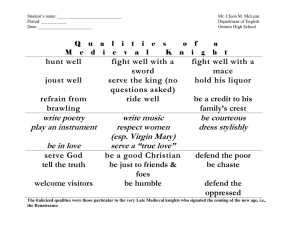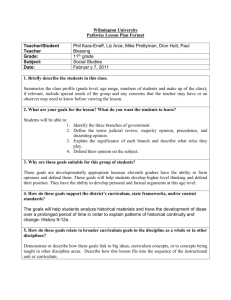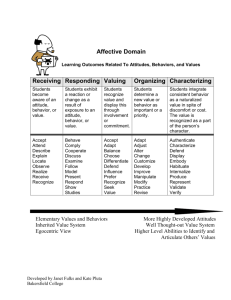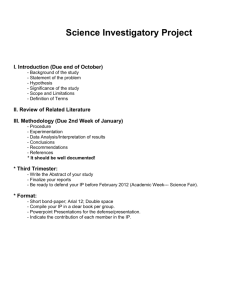Argument PPT
advertisement
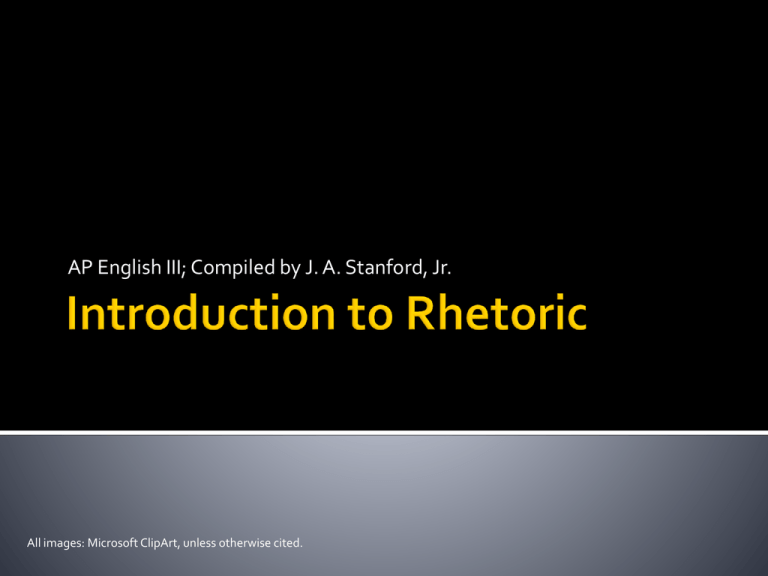
AP English III; Compiled by J. A. Stanford, Jr. All images: Microsoft ClipArt, unless otherwise cited. - College Board, A Guide for Advanced Placement English Vertical Teams Style includes purpose, tone, diction (devices, level, type), syntax, and rhetoric—but rhetoric only matters if the author is making an argument. Rhetoric includes style, because if the author isn’t making decisions regarding purpose, tone, diction, and syntax, the rhetoric is ineffective. Ethos: an ethical appeal = the writer must convince his audience of his good character Pathos: an emotional appeal = the writer offers nothing but simple responses to a complex problem, relying on stereotyping and emotion in place of facts or reason Logos: a logical appeal = the writer must construct an argument using a thesis supported by evidence Inductive reasoning Deductive reasoning • moves from the particular to the general, from evidence to a generalization or theory • the scientific method • moves from the general to the particular • Major premise “If…” • Minor premise(s) “And if…” • Conclusion “Then…” Inductive reasoning Deductive reasoning • A child burns herself 3 times she touches a stove She decides that stoves burn • If stoves burn • And if this new thing is a stove • Then this new thing will burn me AP English III; Compiled by J. A. Stanford, Jr. All images: Microsoft ClipArt, unless otherwise cited. The statement must (1) present a position about which people may disagree; (2) offer an opportunity to argue for one possible solution (from at least two) Subordinating conjunction Statement Claim The statement must (1) present a position about which people may disagree; (2) offer an opportunity to argue for one possible solution (from at least two) Subordinating conjunction Statement Because seniors are responsible enough to Claim make their own decisions, they should be allowed to decide whether or not to have off-campus lunch. The introduction • Seizes the reader’s attention • Establishes common ground • Demonstrates fairness • Establishes ethos • States thesis Background Lines of Argument • Presented in order of importance, or strength Alternative arguments • Advantages and disadvantages Conclusion • Implications • Make strong ethical or emotional appeal • Call to action Inappropriate evidence Assertions Fine for Thesis, Topic Sentences, Intro, Conclusion) Pathos Fine for Thesis, Topic Sentences, Intro, Conclusion) Ethos (example: aphorisms) Logical fallacies, including: ▪ Unreliable statistics ▪ Invalid statistics ▪ Weasel words Fine for Intro, Conclusion Weak evidence Vague or overgeneralized facts Pop culture references Strong evidence: Use the USA ARR test. Unified Specific Accurate Adequate Relevant Representative Reject evidence failing any of these 6 standards. Strong evidence Current events (local, municipal, state, national, global) Historical events Literature (and other academic texts) Analogies & hypotheticals Personal anecdotes (if germane to the prompt) AP English III; Compiled by J. A. Stanford, Jr. All images: Microsoft ClipArt, unless otherwise cited. Defend Challenge Qualify Rail against everything Give unsupported opinions (overgeneralize) Supply inappropriate evidence Use low levels of diction Use non-sequiturs Indulge in self-referential commentary Plan the essay Leave space for the introduction and do it last Take a stand and move ahead quickly Complete a thought before moving on Qualify (show both sides) Use active verbs and vary sentence structure What is the issue being debated? What is the speaker’s position on the issue? What key terms must be identified? What deductive reasoning does the speaker use? What evidence does the speaker use for support? What are the implications of these key terms? Summarize or paraphrase the issue. List the pros (defend) and cons (challenge). Assign appropriate evidence for both. Decide to defend or challenge. Organize the evidence. “It is perilous to make a chasm in human affections; not that they gape so long and wide, but so quickly close again.” – Nathaniel Hawthorne… Challenge, defend, or qualify. Summarize or paraphrase the issue. perilous = dangerous make a chasm = denotes a deep crack in the earth’s surface (connotation: a wide divergence of feelings, sentiments, etc.) human affections = fond or tender feelings (friendships… not romantic relationships) List the Assign they =pros antecedent is “affections” not “chasm” Decide to Organize appropriate gape = to open the mouth wide, as in yawning or hunger; tothe stare with (defend) defend or evidence for theand mouth open challenge. evidence. cons both. close = shut (challenge). So it does not mean: You shouldn’t make up quickly after a fight. It means: It is dangerous to hurt a friend’s feelings, not that it creates such a wide separation, but that the relationship may stop altogether. So the issue is: Metaphors for hurt feelings: chasm, gape, things that close “It is perilous to make a chasm in human affections; not that they gape so long and wide, but so quickly close again.” – Nathaniel Hawthorne… Challenge, defend, or qualify. Summarize or paraphrase the issue. List the pros (defend) and cons (challenge). Pros / Defend Cons / Challenge • People of all ages • Honesty should avoid not be sacrificed confrontation merely for rather than work courtesy Assign for a solution Decide •toConflicts will Organize appropriate • Don’t expect defend orhappen; people the evidence for forgivenenesschallenge.should forgive evidence. both. • Politeness is an • Directness is an essential part of essential part of professionalism leadership “It is perilous to make a chasm in human affections; not that they gape so long and wide, but so quickly close again.” – Nathaniel Hawthorne… Challenge, defend, or qualify. Summarize or paraphrase the issue. List the pros (defend) and cons (challenge). Assign appropriate evidence for both. Decide to defend or challenge. Organize the evidence. Strong evidence Current events (local, municipal, state, national, global) Historical events Literature (and other academic texts) Analogies & hypotheticals Personal anecdotes (if germane to the prompt) “The annuls of scientific discovery are full of errors that opened new worlds: Bell was working on an apparatus to aid the deaf when he invented the telephone; Edison was tinkering with the telephone when he invented the phonograph. If a man can keep alert and imaginative, an error is a possibility, a chance at something new; to him, wandering and wondering are part of the same process, and he is most mistaken, most in error, whenever he quits exploring… “Biochemists hold that evolution proceeds by random genetic changes—errors—and that each living thing is an experiment within the continuum of trial and error and temporary success. In nature, correct means harmony. Hesse writes, ‘I am an experiment on the part of nature, a gamble within the unknown, perhaps for a new purpose, perhaps for nothing, and my only task is to allow this game on the part of the primeval depths to take its course, to feel its will within me and make it wholly mine.’” Whitman said it too: “A man is a summons and a challenge.” - Blue Highways by William Least Heat Moon “It is perilous to make a chasm in human affections; not that they gape so long and wide, but so quickly close again.” – Nathaniel Hawthorne… Challenge, defend, or qualify. Pros / Defend • People of all ages avoid confrontation rather than work for a solution • Hypothetical dinner List the Summarize party guests (Vegans), pros or Great Gatsby The (defend) paraphrase • Don’t expect forgiveness and cons the issue. • The West Bank, Gospel (challenge). • Politeness is an essential part of professionalism • Cheney to Leahy on Senate floor Assign appropriate evidence for both. Cons / Challenge • Honesty should not be sacrificed merely for courtesy • Hypothetical Marines in Iraq •Decide Conflicts people to will happen; Organize shouldor forgive defend the • Ann Coulterevidence. “F” word, challenge. France vs. Germany in World War I, Gospel • Directness is an essential part of leadership • JFK “Ask not…” “It is perilous to make a chasm in human affections; not that they gape so long and wide, but so quickly close again.” – Nathaniel Hawthorne… Challenge, defend, or qualify. Pros / Defend • People of all ages avoid confrontation rather than work for a solution • Hypothetical dinner List the Summarize party guests (Vegans), pros or Great Gatsby The (defend) paraphrase • Don’t expect forgiveness and cons the issue. • The West Bank, Gospel (challenge). • Politeness is an essential part of professionalism • Dick Cheney to Patrick Leahy on Senate floor Assign appropriate evidence for both. Decide to defend or challenge. Organize the evidence. “It is perilous to make a chasm in human affections; not that they gape so long and wide, but so quickly close again.” – Nathaniel Hawthorne… Challenge, defend, or qualify. Pros / Defend • People of all ages avoid confrontation rather than work for a solution • Hypothetical dinner List the Summarize party guests (Vegans), pros or Great Gatsby The (defend) paraphrase • Don’t expect forgiveness and cons the issue. • The West Bank, Gospel (challenge). • Politeness is an essential part of professionalism • Dick Cheney to Patrick Leahy on Senate floor Assign appropriate evidence for both. Decide to defend or challenge. Organize the evidence. Introduction: Define and explain the importance of the assertion. Thesis = Defend or Challenge. Make your case in the form of body paragraphs. Conclusion: Qualify and leave the reader with something to think about. Don’t ignore any part of the assertion. Organize your body paragraphs according to each level of meaning discovered about the assertion while brainstorming. Varied sources of evidence Qualify effectively AP English III; Compiled by J. A. Stanford, Jr. All images: Microsoft ClipArt, unless otherwise cited. Qualify Reel it in Punch ‘em • It is true that • Certainly • Admittedly • Of course • Obviously • However • But • On the other hand • Nevertheless • On the contrary • Therefore • In short • So • As a result • Thus Good paragraph, right? NO
